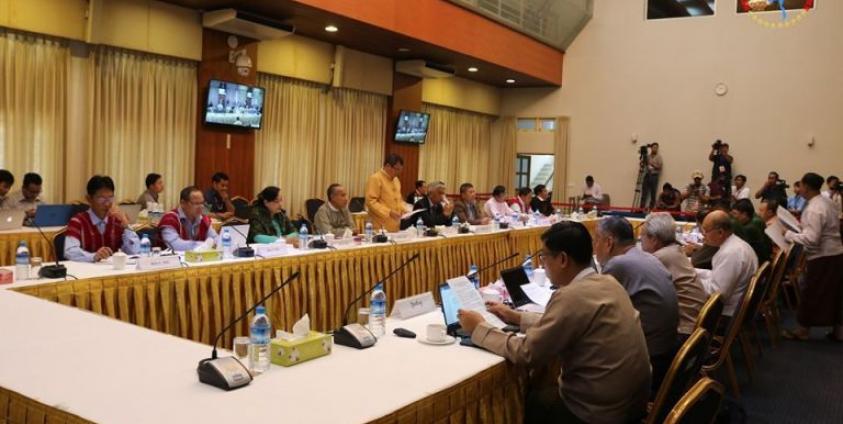The biggest challenge for the ethnic armed groups in the current peace process is the six principles for peace established by the Tatmadaw, says, New Mon State Party [NMSP) Chairman Nai Hongsar. in his recent interview with Mon News Agency (MNA).
In a recent interview with the Mon News Agency (MNA), Nai Hongsar, said, “At the 4th Anniversary of National Ceasefire Agreement (NCA) signing ceremony, the Commander-in-Chief of Defense Services Senior General Min Aung Hlaing, mentioned the Tatmadaw’s six-principles are based on various past lessons. The Tatmadaw resists [altering] those principles, and it is one of the greatest challenges for our ethnic groups.”
The six principles of the Tatmadaw are:
(1) To have a keen desire to reach eternal peace;
(2) To keep promises agreed to in peace deals;
(3) To avoid capitalizing on the peace agreement;
(4) To avoid placing a heavy burden on local people;
(5) To strictly abide by the existing laws;
(6) To “march” towards a democratic country in accordance to the 2008 constitution
Ethnic parties and their armed wings are critical of Principle #6, because as written, it preserves key political roles for the Tatmadaw, including an effective veto over future amendments to the Constitution.
In addition, the Tatmadaw’s rigid adherence to these 6 principles has been interpreted as a warning to ethnic parties not to seek ‘loopholes’ in the NCA and to stop collecting taxes and customs duties in jurisdictions the Tatmadaw controls (Principle #4).
Nai Hongsa continued that “there is no change in Tatmadaw’s stance, and if the Tatmadaw resists [negotiations of] their six principles [for peace], obstacles will still exist.”
According to the Chin National Front (CNF) Vice President Dr. Salai Lian Hmung Sakhong’s interview posted on NCA Ethnic Armed Organization (EAO) signatory social media page “we will attempt to have a discussion whether from the security session of Union Peace Conference or under the principle of democracy regarding the [Tatmadaw] principle that places all armed forces under the civilian government control.
Dr. Salai Lian Hmung Sakhong added, “We cannot keep going with the civil war, which has been around more than 70 years without a security principle under a democratically elected civilian government.”
Efforts to re-negotiate these principles is evident by the recent move of the 45-member constitutional committee who submitted two draft amendments to the Pyidaungsu Hluttaw on January 27th calling for the elimination of the section 20 subsection [c], which preserves a key role for the Commander in Chief of Defense Services and be the leader of all armed forces.
At the recent 8th Joint Implementation Coordination Meeting for the Nationwide Ceasefire Agreement, the government’s representatives and the ethnic armed organization signatories to the Nationwide Ceasefire Agreement (NCA-S EAO) reached eight agreements, including a decision to hold the Union Peace Conference-21st Century Panglong (Fourth Meeting) in April.








